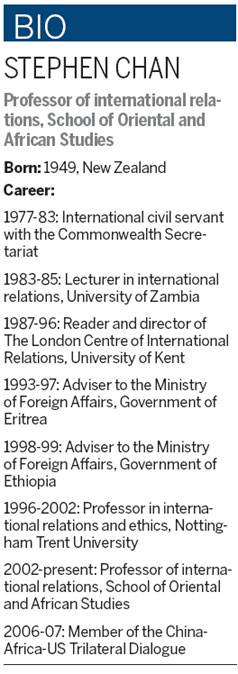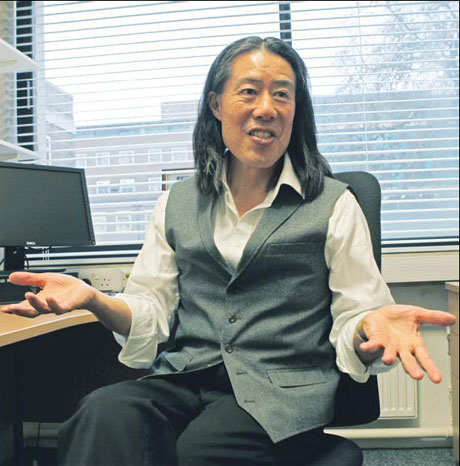The Chinese connection
Updated: 2013-02-22 07:18
By Cecily Liu and Zhang Chunyan (China Daily)
|
||||||||
|
Stephen Chan says the Chinese government can build a better image in Africa by organizing intensive training sessions to educate private Chinese entrepreneurs to respect foreign cultures before they head overseas. Zhang Chunyan / China Daily |
Scholar says China understands Africa's need for development better
China can sympathize with Africa's aspirations in a way the West cannot, says Stephen Chan, professor of international relations at London's School of Oriental and African Studies.
The 64-year-old scholar, a leading global expert on the China-Africa relationship, says Chinese aid to Africa is more generous and better suited to the continent's needs.
"I think China tends to take Africa more seriously in terms of what Africa sees is their future, whereas the West is prepared to help Africa but with a limited vision," he says. "Maybe the Western thinking is something from the colonial days, where a little bit was enough. But Africans are very modern and they want to develop like everyone else."
Chan's knowledge of Africa comes from work experience. He became an international civil servant with the Commonwealth Secretariat, the main intergovernmental agency of the Commonwealth of Nations, at the age of 28. During his post he witnessed Zimbabwe's independence first hand and has subsequently worked across Africa on diplomatic and academic assignments.
He says one good example of Chinese generosity is a $9 billion deal signed in 2008 between China and the Democratic Republic of the Congo, where China proposed to build a set of infrastructure projects in Congo in return for rights to develop a copper and cobalt mine.
The agreement also offered the construction of two universities as well as basic infrastructure such as roads and railways, which Chan says is in sharp contrast to Western donors' frequent offers of primary schools.
"The Chinese understand the aspirations of the Africans to have their children educated, not just so that they can read and write, but to be fully educated at the university level," he says.

But the deal between China and Congo came under pressure from Western donors who said they will not offer relief on historic debt of $11 billion (8 billion euros) to the cash-strapped government of President Joseph Kabila if the country accepts the Chinese agreement.
In 2009, a renegotiated deal was announced. In the new contract, China's aid to Congo was trimmed to $3 billion, which meant several infrastructure projects in the original agreement, including the two universities, would also be cut.
In 2010, Congo was granted debt relief worth up to $12.3 billion from the International Monetary Fund and the World Bank.
Chan says that he feels sorry about the canceled university plans. He says that Western donors pushed for the deal's renegotiation because they, too, want a share of Congo's mining resources.
"The West is very frightened that China is making a good impression on Africa and that the Chinese are putting in a lot of money upfront to secure future mining rights."
While he explains that China has a keen interest in Africa's natural resources, he argues that China provides Africa with important infrastructure and trades with African countries on equal terms.
"China wants to help Africa develop, but at the same time China wants to create a trading relationship with Africa so China itself becomes more prosperous," he says.
Chan says China has actively contributed to the development of Africa's infrastructure, including stadiums and concert halls.
Chan says Chinese infrastructure projects in Africa are often less expensive and achieved within deadline as compared to projects initiated by Western nations.
"Western contracts are often given to Western companies, who have to make a profit. But the profit motive is not so strong for Chinese companies, who are often state-owned enterprises," he says.
He says Africans welcome the efficiency and speed at which Chinese companies complete projects. One shortfall, however, is that knowledge and an understanding of the construction process isn't always transferred.
In Chan's view, Chinese projects will be better received by Africans if Chinese companies share their expertise.
He says the construction of the Tazara Railway between 1970 and 1975 was a perfect example. Linking landlocked Zambia to the Dar es Salaam Port in Tanzania, the railway was a project funded and built by China.
In the construction of the railway, many Africans worked alongside Chinese engineers. Their friendships became the stuff of legend through word of mouth and African films.
He says another way the Chinese government can build a better image in Africa is by organizing intensive training sessions to educate private Chinese entrepreneurs to respect foreign cultures before they head overseas.
He says Africans embrace foreigners who respect their culture, citing as an example the respected Gabonese diplomat Jean Ping, who was born in 1942 to a Chinese trader and a Gabonese woman.
Between 2008 and 2012, Ping served as the chairperson of the Commission of the African Union, effectively the highest civil service role in Africa.
"The Africans had no problem accepting him, who cares that he is half Chinese?" Chan says.
Chan, like Ping, is also readily accepted by Africans. He says it is his multicultural background that has helped him see Africa clearly.
Chan was born in 1949 in New Zealand to Chinese parents. He subsequently became an academic and has held posts in various institutions.
Between 2006 and 2007, Chan participated in the Africa-China-US Trilateral Dialogue as a member of the African delegation. The summit was a series of discussions between diplomats from China, Africa and the US in an attempt to examine ways to cooperate more effectively.
His work in the trilateral dialogue brought him to China for the first time and he says that working with Chinese diplomats made him more aware of the fact that patience is required in communication between Chinese and African people.
Chan says he is fully confident that future opportunities for cooperation between the two rising powers will materialize, especially in the trade of high-end products and in the research and development of design technology.
Contact the writers at zhangchunyan@chinadaily.com.cn and cecilyliu@chinadaily.com.cn
(China Daily 02/22/2013 page24)

 Li Na on Time cover, makes influential 100 list
Li Na on Time cover, makes influential 100 list
 FBI releases photos of 2 Boston bombings suspects
FBI releases photos of 2 Boston bombings suspects
 World's wackiest hairstyles
World's wackiest hairstyles
 Sandstorms strike Northwest China
Sandstorms strike Northwest China
 Never-seen photos of Madonna on display
Never-seen photos of Madonna on display
 H7N9 outbreak linked to waterfowl migration
H7N9 outbreak linked to waterfowl migration
 Dozens feared dead in Texas plant blast
Dozens feared dead in Texas plant blast
 Venezuelan court rules out manual votes counting
Venezuelan court rules out manual votes counting
Most Viewed
Editor's Picks

|

|

|

|

|

|
Today's Top News
Boston bombing suspect reported cornered on boat
7.0-magnitude quake hits Sichuan
Cross-talk artist helps to spread the word
'Green' awareness levels drop in Beijing
Palace Museum spruces up
First couple on Time's list of most influential
H7N9 flu transmission studied
Trading channels 'need to broaden'
US Weekly

|

|








